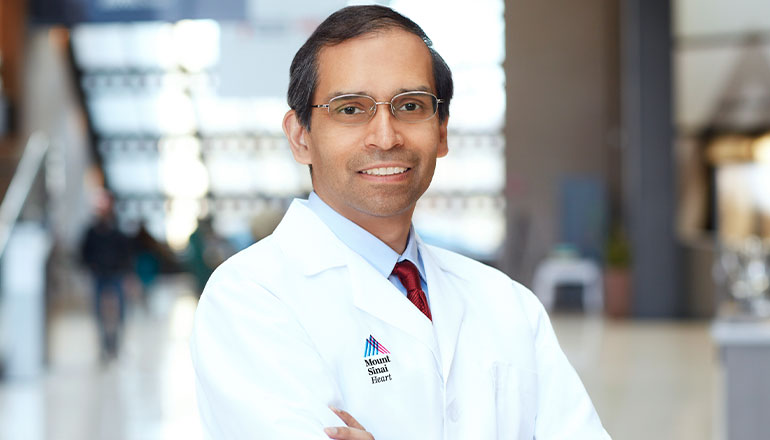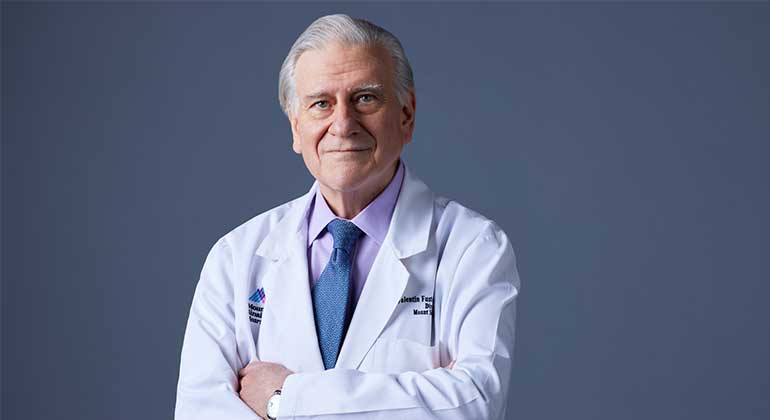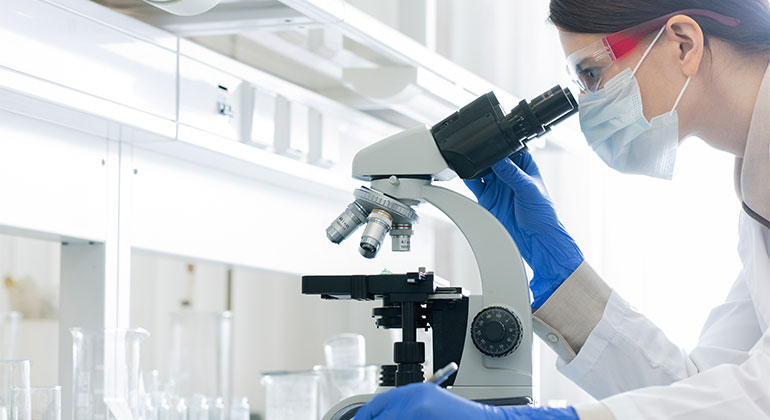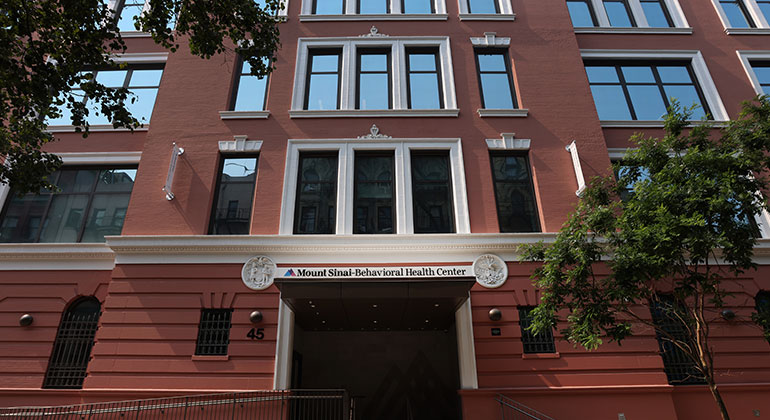Mount Sinai and Stony Brook Announce Affiliation
Stony Brook Medicine and the Mount Sinai Health System today announced that they are entering into an affiliation agreement that includes collaboration on research, academic programs and clinical care initiatives, effective immediately. The institutions launched the partnership to heighten academic and research synergies and to promote discovery, provide expanded clinical trials for both institutions, and achieve breakthroughs in understanding and treating disease.
“This is a momentous day for academic medicine, health care, our respective students, faculty and staff, and for all those who are cared for by our teams of highly trained, dedicated clinicians,” said Stony Brook University President Samuel L. Stanley Jr., MD. “Each institution has so much to offer, so this is an opportunity that will prove to be beneficial for all – now and in the future – as we explore and grow this incredible collaboration.”
“Mount Sinai and Stony Brook bring unique strengths to this partnership, and together we will use our outstanding resources to create changes in medicine,” said Kenneth L. Davis, MD, President and Chief Executive Officer of the Mount Sinai Health System. “We are committed to further developing this exciting collaboration and finding new ways to enhance academics and clinical care. “
“The partnership will revolutionize medical research by combining expertise from both premier medical schools,” said Dennis S. Charney, MD, Anne and Joel Ehrenkranz Dean, Icahn School of Medicine at Mount Sinai, and President for Academic Affairs, Mount Sinai Health System. “Both institutions are committed to a culture of innovation in research and education, and we look forward to working with Stony Brook to help make exciting breakthroughs in health care.”
Expanding Research and Academic Programs
The Icahn School of Medicine at Mount Sinai and Stony Brook University will collaborate to develop a wide range of research programs in fields including biomedical engineering and computer science; drug discovery and medicinal chemistry sciences; neuroscience, neurology and psychiatry; basic biology and novel therapeutics; and, public health and health systems. The alliance will capitalize on Stony Brook’s expertise in mathematics, high-performance computing, imaging, and the physical and chemical sciences, and Mount Sinai’s strengths in biomedical and clinical research, and health policy and outcomes.
“The opportunities for amazing science to spring from our collaborative efforts are truly boundless,” said Kenneth Kaushansky, MD, Senior Vice President for Health Sciences, and Dean of the Stony Brook University School of Medicine. “When you bring the intellectual and biomedical horsepower of the Icahn School of Medicine faculty together with the outstanding neuroscientists, cancer biologists, imaging innovators, cardiovascular experts, and leading biomedical informaticists of the Stony Brook School of Medicine, as well as the world-class departments of computer sciences, biomedical engineering, chemistry, and applied mathematics at Stony Brook University, the possibilities are staggering. Then add the Stony Brook Schools of Health Technology, Dental Medicine, Social Welfare, Nursing, and Pharmacy into the mix. Health sciences education can only flourish, and the possibilities for innovative approaches to clinical care are not just theoretical, but expected. We look forward to working with Mount Sinai on large-scale research and clinical collaborations that will transform health care from Manhattan to Montauk.”
Through the partnership, the schools will develop joint graduate and medical educational programs in all areas, leveraging the strength of existing master’s and doctoral programs at each institution. Students will have the opportunity to take classes on both campuses, allowing them to learn new techniques and expand their learning capacity. Mount Sinai and Stony Brook will also build summer programs for undergraduate, graduate, and postgraduate students.
In addition, Mount Sinai and Stony Brook will invest a combined $500,000 to launch competitive and unique pilot programs, with the intent to receive collaborative external funding. Projects will be determined and overseen by a committee composed of three representatives from each institution.
“We will establish a joint committee to evaluate proposals and decide on what projects to pursue,” said Eric Nestler, MD, PhD, Dean for Academic and Scientific Affairs, Nash Family Professor and Chair of the Fishberg Department of Neuroscience, and Director of the Friedman Brain Institute at the Icahn School of Medicine at Mount Sinai. “This is a major investment that will have a dramatic influence on both campuses’ ability to advance education, research, diagnostics, and treatment.”
“Major breakthroughs in improving diagnostics and therapeutics in health care come from research, usually starting at the very basic level and moving into translational and clinical research and eventually to the bedside,” said Lina Obeid, MD, Dean for Research and Vice Dean for Scientific Affairs at Stony Brook University School of Medicine. “Stony Brook Medicine and the Icahn School of Medicine at Mount Sinai are two power-houses of research that when partnered will definitely yield greater discoveries than just the sum of their parts. The joint pilots in research have immense promise to advance health at the most exciting time in the biomedical sciences, including advanced computational, bioinformatic, and engineering approaches.”
About Stony Brook Medicine
Stony Brook Medicine integrates and elevates all of Stony Brook University’s health-related initiatives: education, research and patient care. It includes five Health Sciences schools — Dental Medicine, Health Technology and Management, Medicine, Nursing and Social Welfare — as well as Stony Brook University Hospital and more than 50 community-based healthcare settings throughout Suffolk County.
To learn more, visit www.stonybrookmedicine.edu.
About Stony Brook University School of Medicine
Established in 1971, the Stony Brook University School of Medicine includes 25 academic departments. The three missions of the School are to advance the understanding of the origins of human health and disease; train the next generation of committed, curious and highly capable physicians; and deliver world-class compassionate healthcare. As a member of the Association of American Medical Colleges (AAMC) and a Liaison Committee on Medical Education (LCME) accredited medical school, Stony Brook is one of the foremost institutes of higher medical education in the country. Each year the School trains nearly 500 medical students and more than 480 medical residents and fellows. Faculty research includes National Institutes of Health-sponsored programs in neurological diseases, cancer, cardiovascular disorders, biomedical imaging, regenerative medicine, infectious diseases, and many other topics. Physicians on the School of Medicine faculty deliver world-class medical care through more than 30,000 inpatient, 80,000 emergency room, and approximately 350,000 outpatient visits annually at Stony Brook University Hospital and affiliated clinical programs, making its clinical services one of the largest and highest quality on Long Island, New York.
To learn more, visit www.medicine.stonybrookmedicine.edu.
About the Mount Sinai Health System
Mount Sinai Health System is one of the largest academic medical systems in the New York metro area, with more than 43,000 employees working across eight hospitals, over 400 outpatient practices, nearly 300 labs, a school of nursing, and a leading school of medicine and graduate education. Mount Sinai advances health for all people, everywhere, by taking on the most complex health care challenges of our time — discovering and applying new scientific learning and knowledge; developing safer, more effective treatments; educating the next generation of medical leaders and innovators; and supporting local communities by delivering high-quality care to all who need it.
Through the integration of its hospitals, labs, and schools, Mount Sinai offers comprehensive health care solutions from birth through geriatrics, leveraging innovative approaches such as artificial intelligence and informatics while keeping patients’ medical and emotional needs at the center of all treatment. The Health System includes approximately 7,300 primary and specialty care physicians; 13 joint-venture outpatient surgery centers throughout the five boroughs of New York City, Westchester, Long Island, and Florida; and more than 30 affiliated community health centers. We are consistently ranked by U.S. News & World Report's Best Hospitals, receiving high "Honor Roll" status, and are highly ranked: No. 1 in Geriatrics and top 20 in Cardiology/Heart Surgery, Diabetes/Endocrinology, Gastroenterology/GI Surgery, Neurology/Neurosurgery, Orthopedics, Pulmonology/Lung Surgery, Rehabilitation, and Urology. New York Eye and Ear Infirmary of Mount Sinai is ranked No. 12 in Ophthalmology. U.S. News & World Report’s “Best Children’s Hospitals” ranks Mount Sinai Kravis Children's Hospital among the country’s best in several pediatric specialties.
For more information, visit https://www.mountsinai.org or find Mount Sinai on Facebook, Twitter and YouTube.

Mount Sinai Reports Progress on Its Road Map for Action to Address Racism
Jun 07, 2023 View All Press Releases
New York’s Mount Sinai Health System Opens Concierge Medicine Practice in West Palm Beach
May 15, 2023 View All Press Releases
Deepak L. Bhatt, MD, MPH, Named Director of Mount Sinai Heart
Oct 31, 2022 View All Press Releases
Valentin Fuster, MD, PhD, Named President of Mount Sinai Heart
Oct 18, 2022 View All Press Releases
